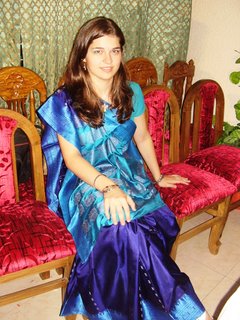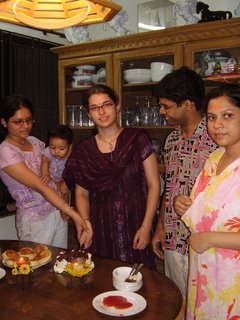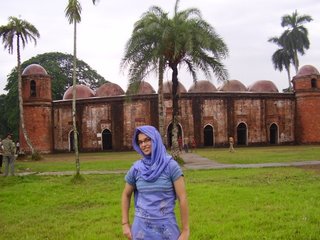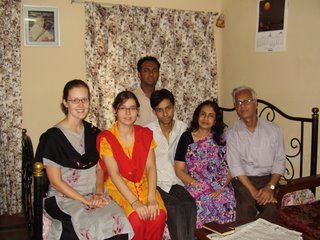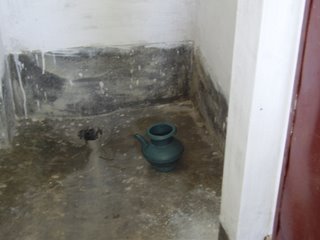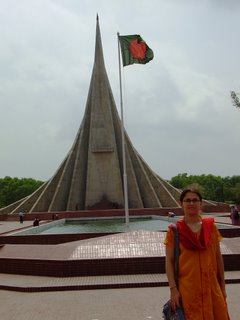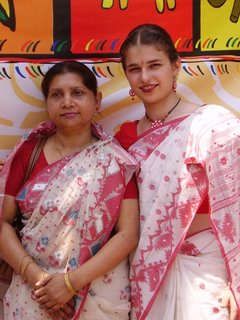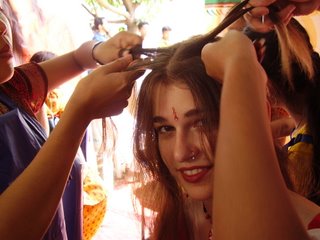“Amar Shonar Bangla”
31 of May 2006
Mirpur, Dhaka
Bangladesh
Mirpur, Dhaka
Bangladesh
“Amar Shonar Bangla”,
Kemon achen?
Ami khub bhalo! As you know very well, I’ve been here for four months. Now It’s time to go, so I want to share with you a little of this amazing cultural experience I had.
If I had to describe you in one word, it would be extremely difficult. I could say you are a green country, but I would be excluding the dirty and polluted Dhaka; I could say you are a country of poor people, but then one could ask me about all those posh and nice homes in Gulshan and Banani; I could say you are the small street food shop’s country, but I would be excluding the nice and clean restaurants, Bashundara City shopping mall and your five stars hotels; I could say you are a country of many madrasa school’s, but could not forget all English Medium schools; I could say you have small and dark streets, but should also mention the illuminated Airport Road… for those and much more I would describe you as the contradictory country (as mine).
I have to confess that these four months were enough to touch me deeply. I am completely in love about your people, your culture and your beauty. However, there are few things I completely dislike on you and, I’m sorry, but I must tell you, otherwise this won’t be a good “impressions-letter”.
I hate the habit people have to throw garbage anywhere. Did you know that your capital city in many places looks just like a very big dustbin? I also don’t like the power problem – who does? Every single day we have to deal with no electricity hours, either forcing us to climb up seven floors by foot or making us loose our last hour’s work in the computer (of course we know we should save every five or ten minutes, but sometimes we just don’t remember!). Also without electricity we have to handle our activities without a/c and in many places with no fan, which is inhuman sometimes! The third point I should mention are CNG drivers. Why they are so bad at me? I know they want to have as much profit as possible and seeing a foreigner makes their eyes light, but why can’t they try to be nice to me or understand that I’m only a student and don’t have the wallet with plenty of dollars? “Ami ekjon chattri. Amar taka nai!!!”
On the other hand I really love rickshaw rides. First it sounded weird to be pulled by a human, but it’s the way he earns money and here is so common that I had to overcome that cultural prejudice and got used to it. As one of my friends described, “It is so private!” I like it especially in evening time, with the wind coming to my face and, of course, it is even better if besides me there’s a nice guy. Rickshaw rides with ‘tinjon’ are funny and not everybody is brave enough to be the one up. I can do it.
Mentioning the wind on my face I can’t forget the amazing boat trips trough over the thousand liters of water you have. While on small, big, fishing or tourism boats I saw all the beauty and day-by-day activities of your village people, either taking shower or washing their clothes. Van rides in villages are also amazing and can provide a nice “on-face-wind”. Traveling on good or damaged roads I was hypnotized by the green, green and green I could see in all those paddies!
I can’t forget to mention that the traffic jam in Dhaka is the worst I’ve ever seen. When I started driving in Sao Paulo some people told me that who can drive in Sao Paulo can drive anywhere. I don’t agree: who can drive in Dhaka can drive anywhere! Needless to say that until now sometimes I look to the wrong side while crossing the road, as the cars here are right hand. The traffic isn’t bad just because it’s slow: on the first ride in any kind of transportation one can be really scared with those crazy drivers who never stop horning. Bus rides on roads are the scariest: I saw my death so close many times while riding buses to reach places outside Dhaka. If one wants adrenaline doesn’t have to go to Fantasy Kingdom or practice radical sports, just come to Bangladesh and go on a bus trip! By the way, one can find everything inside those buses: some people even take alive chickens and in each stop or ferry all those beggars and sellers come inside. About Bangladeshi buses I still have a question: I know in average Bangladeshi people are short and thin, but how can they feet on those local buses with so close and small seats?
Talking about short people, for the first time in my life I felt myself tall. Bangladeshi girls are usually shorter than me. I just found an excuse not to use high heel shoes – which I hate so much and can’t use longer because my operated knee starts paining.
About clothes, I like sawlar kameez, though in the beginning I thought it was just like the winter pijamas we use to sleep, because the pants are too loose. Can you believe that once I almost caught fire because I forgot I was wearing an “orna” and there was a lighted candle on the table? Sometimes it’s hard to remember that I’m wearing too much fabric!!!
Saris are also very beautiful and they make girls and women look really feminine. The first time I saw an opened sari I wondered how was it possible to make that big fabric become such a gorgeous dress in a while. Now I understand there’s technique to cover the blouse and petticoat. I like wearing a sari and I feel myself “shundor” whenever I try one on, though sometimes it is hard to walk and I can’t understand how women can work all day with such dress!
About men clothes, it was weird when I first saw that men here wear ‘skirts’. Now I’m used to see “lungis” and finally understood how they put it on. Of course the beach guys in Brazil with those built-bodies, wearing sleeveless t-shirts call girl’s attention, but I got totally delighted to see how nice guys here look when they wear panjabis (I’m sure my Brazilian girl friends won’t understand and will call me crazy).
The way people here cover their body is another thing I got impressed with. We never see guys wearing shorts on the streets and even if it is 40 Celsius degrees many of them will wear long sleeves shirts! Needless to say that the most impressive scene was to see women wearing burcas in sea beach!
Contrary of what I thought before, young people here usually wear jeans and t-shirt and also modern “fotuas”. Of course t-shirts used by girls must not be tight as the ones we use in Brazil and it is good to wear an “orna” also. (People asked me why suddenly I started wearing “orna” almost all the time, even with t-shirt, and I explained it wasn’t so comfortable to have rickshaw pullers ‘eating me with their eyes’).
Not only rickshaw pullers, but almost everybody stares at me on the streets. You know what, on my first month here I felt myself like an alien because of that. However, now I find it funny whenever I listen “Please, madam!”; “Come in sister!” and also have fun when I’m walking and the guy in the nearest shop says “Thank you!” – I’m always wondering if he is too much pleased to see me or if this is the only sentence he knows in English.
Another funny thing is the kind of question people usually ask me wherever I go. “Madam, married or unmarried?”; “Is it available in your country?” – While pointing cars, fruits or anything. I don’t understand why even people with broken English love this word “available”. Isn’t it a hard word to pronounce?
People here are very friendly and even if their English is not good, they try their best to make themselves understandable. They become really excited when they realize I can speak a little and basic Bangla and also when I say “Amar desh Brazil” – although sometimes I have to fight to make them believe that even if I don’t have the same skin color almost all the soccer players have, and even if I can’t dance samba, I am, really, a Brazilian – because they like soccer a lot. During World Cups the country is divided between Argentina and Brazil supporters. From now I can see some Brazilian flags around Dhaka and thousands of green and yellow t-shirts on markets. Almost all the people I met swear to be Brazilian supporters, though I know some of them just hide their real identity of Argentinean supporters because they know it would sound for me just like a cricket Pakistani supporter for them.
As the subject now is sport, I must say that I’ve been putting on weight here and have been eating too much! If in the beginning I used almost to cry whenever I bitted a green chili accidentally, now I can eat and I like spice food. Despite in Brazil our main food is also rice; we don’t eat too much “vhat’ as your people! Some families eat three times every day and not only one or two spoons as we do, but the whole plate – and very very full! I like “polao”, even if sometimes it seems too much oily to eat at night (especially because dinners here are usually much later than in Brazil). I’m lucky because you have the best of mango, my favorite fruit, and I founded it also “khub mojha” green mango with spices. I enjoyed also the new fruits I tried here, as “tal” and “lichu”. My favorite breakfast is “paratha” and “dal”, or meat, or “subji” and, of course, tea. I became a “cha” lover, specially “dudh cha”.
I can't forget to tell you that eating with hands have been too much interesting. Actually I enjoyed a lot and don't want to use knife and fork anymore. For people in Brazil I'm sure it seems to be not hygienic or maybe disgusting, but as one of my Bangladeshi friends said: "Who knows where this fork was before beeing in your mouth?! Your hand you know is clean, because you just washed". I'm also glad because another friend gave me 100 out of 100 in "eating with hands" subject, as I could eat with my fingers without making the palm of my hand dirty.
About the culture itself, I really appreciate how important family is to people here. In Brazil it is not common to know and have a relationship with our grandmother’s sisters/brothers and our second, third and fourth cousins, as I could see here in many cases. Learning related-to-family words in Bangla is really, really tough, because while in English and Portuguese every father’s/mother’s sister/brother/sister in law/ brother in law is uncle/aunty, you have thousand names! Even paternal and maternal grandparents are called differently!
Curiously, men holding hands or hugging each other doesn’t mean they are lovers – they are only acting friendly. In Brazil guys never allow other guys to touch them; and men crouched down on the streets are usually peeing. It happens in some places in Brazil also, but not so publicly as here and they handle it standing up.
It sounds completely unusual that after getting married guys still live with their parents – in Brazil many people are looking forward to get married to leave parents home and it sounds bad if in certain age they are still living with parents!-, but the most weird, culturally unacceptable, for me - are not the arranged marriages, as one can think -, but imagine that girls have to live with their in laws after marriage. One of my Bangladeshi friends, trying to make me understand that in some cases it works, told me: “As, you know, love is blind”. Love can be blind, but mother in laws aren’t dumb! (It will sound extremely rude for Bangladeshi readers and funny for Brazilian readers. It makes me think once more about how interesting cultural differences are, despite once my heart, while biting faster, almost gave up smiling the cultural diversity to cry the intangibility of those beautiful black eyes).
As you can see, once I was only a Brazilian girl coming from Kolkata by bus; once I was only a curious eye looking for knowledge; once I was only a young person wishing to live an adventure; once I was only a foreigner coming to a new country; once I was only a Portuguese speaker trying to learn some Bangla words…
But when the border police opened my luggage, took out a pad, started laughing and I felt so bad, there was a mathematics teacher sitting behind me to make me smile; when I arrived in Dhaka after a twelve hours trip, alone, at night, and the man supposed to pick me up was late, there was a nice woman to help me; when I was far from home and relatives, there was a Bangladeshi family to give me love and fulfill specially the lack of mother and sister I had; when I felt myself needless in a country where I couldn’t speak the language or read shop names, there were my Bangladeshi friends to take me out, have fun, go for trips or help me in whatever I wanted (some even before my arrival in Bangladesh).
When I cried, your heat dried my tears;
When I needed a hug, your rivers were like big arms;
When I felt myself like a lost kid, your people hold my hand to cross the street;
When I run out of inspiration, your green made my eyes shine.
So, now, I’m still a Brazilian girl going back to Kolkata by bus, but I’m also hypnotized eyes; I’m also a completely delighted young person; I’m also a little Bangladeshi; and I am also very, very proud because I can speak at least “olpo olpo” of the only language in the world for which its people died.
After these four months I realized that my roots – which I love so much! – I didn’t choose, but my heart, my heart wants to be a Bengali.
“Amar shonar Bangla, ami tomai bhalobashi”.
Yours,
Leticia Lara (Leticia Bengali)
PS: In spite of you having destroyed my hair and skin, I will miss you!

